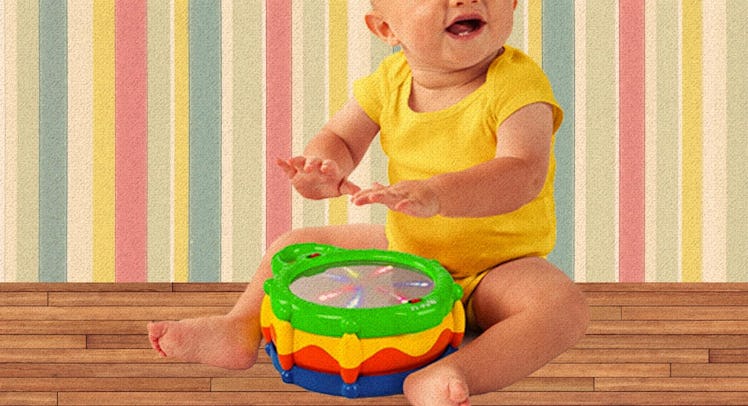Man, I Hate Baby Music Class
I was eager to share my love of music with my daughter. But when faced with the reality of baby music classes, I found them excruciating.

I can’t remember any of the lessons in my daughter’s baby music class. But the face of the parent who helped convince me to quit is burned into my memory.
Five people showed up to my fourth and final baby class three years ago: two babies, one teacher, and two dads. I started the session with high hopes. For once, I wasn’t the only dad. And unlike previous classes where kids fought over percussion instruments, there’d finally be enough drums to go around.
But we didn’t play any drums that day. Instead, we each held our kids and danced in a circle. Both kids started wailing but the teacher kept up the circle. The other dad continued bouncing his crying kid in a dance of joyless determination. I put on my shoes and left.
I’d gone into the classes with an open mind. I’m an enthusiastic, semi-talented musician and I was eager to share my love of music with my daughter. But when faced with the reality of baby music classes, I found them excruciating. The classes weren’t right for my kid. Moreover, I worried they unwittingly fostered an unhealthy approach to music among parents.
Baby music classes never stopped being ridiculous to me. In each class, eight to 12 parents sat with their young as a teacher led us through simple songs, dances, and rhythmic exercises. The kids in the class were nine months or younger and only seemed in tune or impressed with the curriculum when they got a drum. With the varying ages, it seemed impossible for the teacher to find a teaching approach that engaged all the kids.
I’m an enthusiastic, semi-talented musician and I was eager to share my love of music with my daughter. But when faced with the reality of baby music classes, I found them excruciating.
Now, despite my experience, I can see benefits in baby music classes. They get new parents out of the house and let them mingle with other parents who are as sleep-deprived and overwhelmed as they are. Otherwise, parents might learn songs their kids like or simply have a nice time if their kids enjoy the class.
These are modest benefits and far from guaranteed. I didn’t meet any new parents, for example. A big collection of moms already knew each other and the rest seemed reluctant to talk shop with a dad. Being among a roomful of moms discussing stroller brands like the business card scene in American Psycho didn’t seem worth the effort of packing a diaper bag.
The other parents there were treating the baby music classes like picking out a stroller, as an investment in their children’s development and future. Early music lesson network Music Together says the classes are meant to be fun bonding opportunities for parents and children that form the runway for future musical endeavors to take flight. But, in my experience, parents view the classes as an obligation they need to undergo to ensure their kid’s cognitive development doesn’t fall behind.
Partly, the connection between brain development and music stems from a discredited child brain development concept. According to The Mozart Effect, the simple act of listening to classical music can make people smarter. The effect has a major flaw, though. It isn’t real. The music of Mozart is powerful but it’s not the Limitless pill. In truth, the Mozart effect is based on a misreading of a study and later exploited as a marketing pitch to convince expecting parents to buy classical music packaged for children.
You shouldn’t feel obligated to do music lessons when they’re babies unless you enjoy it. Otherwise you’ll end up like that dead-eyed dad, dancing when you don’t want to, thinking you’re doing something he have to
While passively listening to music doesn’t help a brain, actively playing music actually might. But parents are going to have to wait a while before they can put that data to work. Kids generally don’t start learning instruments until elementary school. The five-year-old drum prodigies on YouTube are social media sensations for being exceptions, not the rule.
But fretting about whether playing music makes kids smarter is part of the problem. Intentionally or not, baby music classes encourage parents to view music as a means to an end when music is an end unto itself. Learning an instrument is a rich and valuable experience, not a way to trick a kid into being better at math. While music is like a STEM discipline in that it involves numbers, higher reasoning, and precision, it’s not physics or trigonometry. It’s an art capable of conveying profound meaning with an immediacy that’s beyond the capacity of words to describe.
You shouldn’t play your kid Mozart to trick them into being smarter or better behaved. It’s a waste of time and a disservice to Mozart and you as well. Play Mozart because it’s beautiful and interesting. Likewise, you shouldn’t feel obligated to do music lessons when they’re babies unless you enjoy it. Otherwise, you’ll end up like that dead-eyed dad, dancing when you don’t want to, thinking you’re doing something he has to.
This article was originally published on